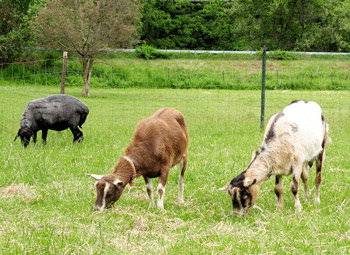stockyards employs goats as nature's lawnmower for vacant lots

Megan Meister chuckles as she thinks of the unlikely collision of worlds involved in planting four eat-everything-in-sight goats in the midst of Stockyards -- a neighborhood that long ago shed its past as the home of the city's slaughterhouses.
Yet to Meister, the ebullient director of the Stockyards, Clark Fulton and Brooklyn Centre Community Development Organization, the area's new "Mow Goats" program is about the re-greening of the neighborhood, teaching kids and families about urban agriculture, and possibly even saving the city some money.
"Kids in urban areas don't get the opportunity to be around farm animals very often," says Meister, who worked with residents, The County Line Farm in Geneva, Ohio and the City of Cleveland to pioneer the 25-day program. "This is a creative way to address the problem of vacant lots in our neighborhood."
The "ladies," as they're known at the office, have a regular 9-to-5 job mowing a lot at W. 61st and Frontier Avenue. When they're done with that -- soon, based on their seemingly unstoppable appetite for anything leafy and green -- they'll be rotated to another lot. Meister hired a full-time goat herder for the project.
The Stockyards office receives a slew of calls every season about mowing lots. The City of Cleveland mows lots a few times per year and attempts to collect from property owners, but lacks the resources to mow them more regularly.
Meister hopes the project can be replicated elsewhere. She estimates that it would cost about $9,000 to $10,000 per six-month season to rent four goats, which is actually cheaper than what the city typically charges property owners to mow lots. The excess goat poop is being used to fertilize neighborhood gardens.
Source: Megan Meister
Writer: Lee Chilcote

